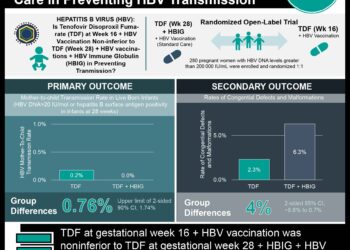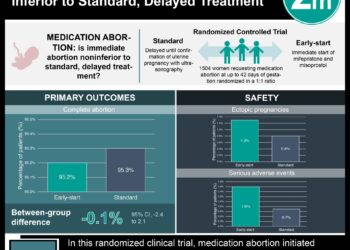Genetic evidence for causal relationships between maternal obesity-related traits and birth weight
1. This retrospective study found that genetically elevated maternal BMI and blood glucose levels were associated with higher offspring birth weight.
2. Genetically elevated maternal systolic blood pressure was associated with lower birth weight.
Evidence Rating Level: 2 (Good)
Study Rundown: Women who are obese, overweight, or develop gestational diabetes are more likely to give birth to neonates that are larger for their gestational age. Yet, the mechanisms that explain associations between maternal risk factors and abnormal birth weight have not yet been delineated. Utilizing mendelian randomization, this study tested single nucleotide polymorphisms (SNPs) associated with maternal risk factors, such as diabetes and hypertension, to determine their effects on neonatal weight. This retrospective cohort study found significant associations between genetically elevated BMI and offspring birth weight. After selecting for genetic variants that were not confounded by BMI, a similar association was found between elevated maternal blood glucose levels and birth weight. Interestingly, genetic elevations in maternal systolic blood pressure (SBP) were associated with lower neonatal birth weight. There were no causal associations between maternal triglyceride, adiponectin, or HDL-C levels and birth weight.
Since mendelian genotypes are randomly allocated at conception, one strength of this study is that confounding factors related to interpreting genetic data are diminished, and results from this study can be used to estimate causal effects of maternal traits. One limitation to this study regards assumptions made about genetic attribution to maternal traits – the possibility that one SNP influences more than one maternal trait cannot be excluded. Another limitation is that the statistical power for certain maternal traits was limited. Overall, the study provides good evidence that genetically elevated maternal blood glucose levels and weight are associated with higher birth weights, and suggests future directions for counseling to avoid negative weight-related birth outcomes.
Click to read the study in JAMA
Relevant Reading: Identification of HKDC1 and BACE2 as genes influencing glycemic traits during pregnancy through genome-wide association studies.
In-Depth [retrospective cohort]: This study sought to determine whether genetically elevated maternal blood glucose levels and weight were associated with neonatal birth weight. The primary outcome measure was birth weight, and exposures included maternal blood glucose levels and various other known obesity risk factors. After exclusion criteria were applied, SNP genotype data was obtained in 30 487 women. Weighted genetic scores incorporating the SNPs were calculated for each maternal trait, and genetic BMI, fasting glucose, and type 2 diabetes scores were all tightly associated with their corresponding maternal traits (p < 0.003).
Associations between these genetic scores and offspring birth weight were then tested. A 1-SD (4 points) increase in maternal BMI was associated with a 55 g increase in offspring birth weight (95%CI 17-93 g). After adjusting for fetal genotype, this association rose to a 104 g increase (95%CI 32-176 g). Furthermore, 1-SD (7.2 mg/dL) increase in genetic maternal blood glucose was associated with a 114 g increase in birth weight (95%CI 80-147 g). After adjusting for fetal genotype, this association rose to 145 g (95%CI 91-199 g). Finally, a negative association was found between genetic maternal SBP and birth weight. A 1-SD (10 mmHg) increase in maternal SBP was associated with a decrease of 208 g in birth weight (95%CI -394 to -21 g). After adjustments for fetal genotype, the estimated effect was -151 g (95%CI -390 to 89 g).
Image: CC/Wiki
©2016 2 Minute Medicine, Inc. All rights reserved. No works may be reproduced without expressed written consent from 2 Minute Medicine, Inc. Inquire about licensing here. No article should be construed as medical advice and is not intended as such by the authors or by 2 Minute Medicine, Inc.







